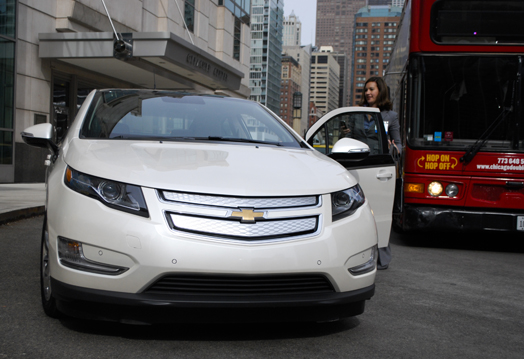Mayor-elect Rahm Emanuel pledges to make Chicago a clean energy nucleus
by
Christen Carter
March 03, 2011
Still positively charged from his victory, Mayor-elect Rahm Emanuel pledged Thursday to make clean energy innovation the focal point of Chicago’s economic growth. He also promised to advance the city as global center for green technology in the process.
“We’re a city that’s on the move. People want to invest in our city,” Emanuel told attendees at the Midwest Energy Forum at the University of Chicago. “And I want to make clean technology the cornerstone of that investment.”
Emphasizing the characteristics that make Chicago an ideal city for such investment – the presence of research institutions, seed capital, high quality of life, and capable entrepreneurs – Emanuel also reminded the audience of the progress Chicago has already made.
“Chicago has more wind companies than any other city in the country. It’s only fitting for the Windy City to have that,” said Emanuel, adding that, “The battery that’s going to be powering the [Chevy] Volt – the research came out of Argonne Laboratory.”
That research, purchased by General Motors Co., allowed for the creation of more than 300 factory jobs, according to Emanuel. Unfortunately, he said, those jobs were in Michigan.
The issue of Chicago research resulting in jobs outside of the city, and national research creating jobs abroad, surfaced frequently at the forum.
Although the conference was in the Midwest, the global region that spurred the most energetic discourse was Asia.
“China right now is leading the U.S. in clean energy deployment,” said Karina Edmonds of the U.S. Department of Energy. “They are coming up pretty quickly and this is why this is a race.”
Speakers at the event emphasized that many of the technologies that have spawned successful businesses in Asia were not invented there.
“You look what other nations are doing – particularly Japanese, Koreans and Chinese,” said Jeffrey Chamberlain of Argonne National Laboratory, “And it’s interesting and frustrating to note that a lot of the technology that is commercialized around the world ultimately had its genesis in the United States.”
Chamberlain argued the U.S. economy would benefit greatly if technology invented here could turn into successful domestic businesses.
“If you look at the potential gross domestic product in the area of energy storage and the vehicles that will use advanced battery systems, we’re talking about, in the coming years, hundreds of billions of dollars,” Chamberlain said.
The prospect of economic growth offered by clean energy innovation was not lost on Emanuel.
“I want you to get moving,” Emanuel said. “This is about economic growth. This is about bringing opportunities to the city, about jobs. We have all the pieces that make Chicago the perfect place to be the center of gravity as it relates to new technology in the field of alternative energy.”
In order to “get moving,” the city’s researchers, entrepreneurs and clean energy technology businesses will need assistance from the government, both locally and nationally, according to the speakers.
Without the research support of the Office of Science and the U.S. Department of Energy, Argonne “would not have these innovations,” Chamberlain said.
Michael Sinkula, co-founder of Envia Systems Inc., a clean-technology materials startup, noted that his company would not have been fully funded without financial assistance from the government.
“In order to compete on a global scale, we do need government support,” said Sinkula, adding that many Asian companies receive significant government aid. “In the U.S., if you’re trying to compete with companies in Asia that do have government support and we don’t get support, you’re already at an imbalance.”
Emanuel appeared to be on board. “I pledge to you as the next mayor, like the mayor before me, to make Chicago the center of gravity for that future. I want to seize it.”
